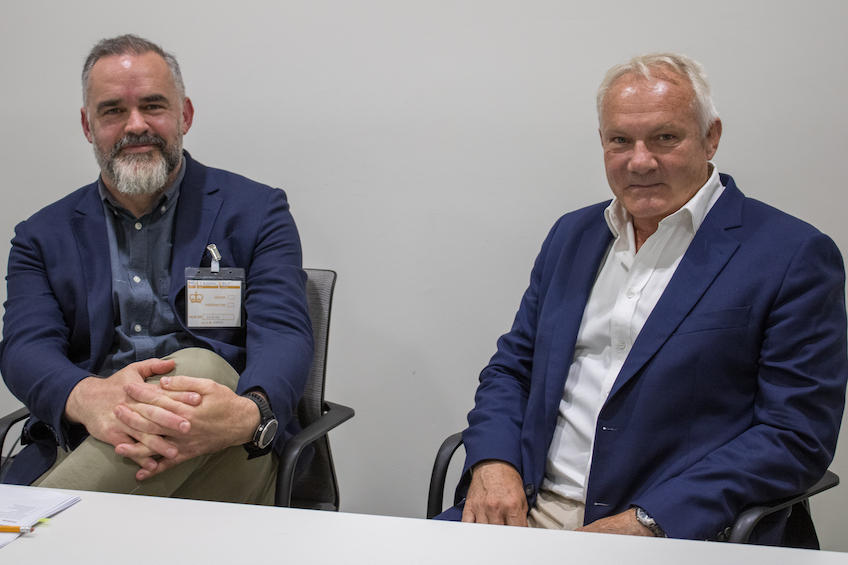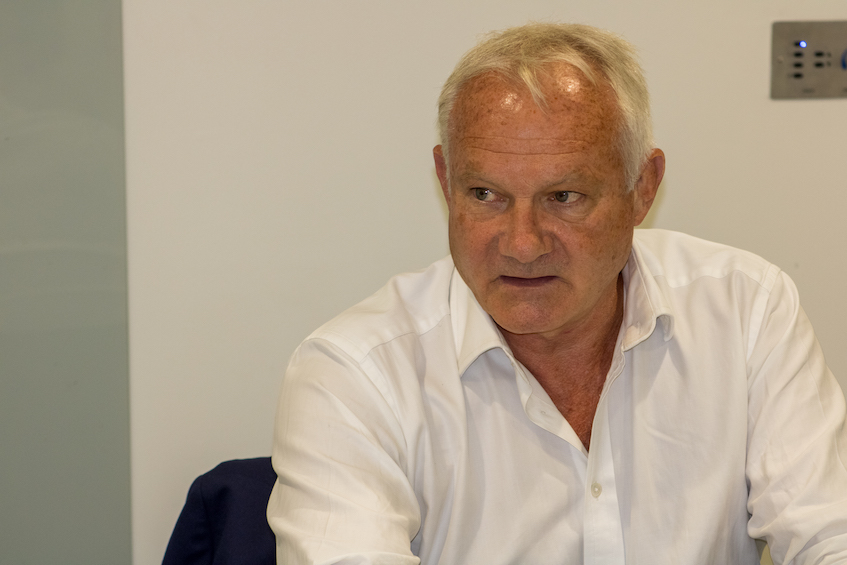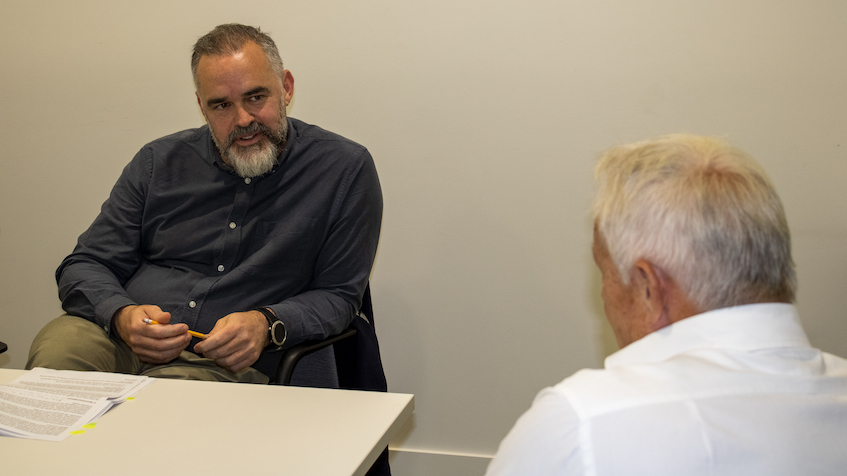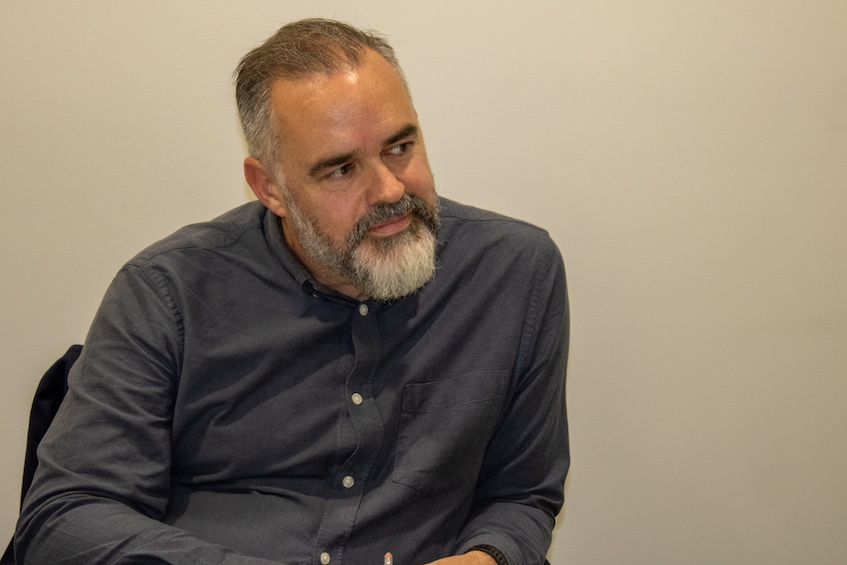In conversation: Sir Gordon Messenger and MiP’s Jon Restell
The review of management and leadership in health and social care by General Sir Gordon Messenger could lead to better career management, more effective training and development and wider opportunities for managers. But much of the detail is still to be worked out and how the review is implemented will be key to its success. Last month, Sir Gordon got together with MiP’s Jon Restell to discusses his review and what it means for MiP members.

In this discussion, Jon and Sir Gordon talk about:
An outside perspective on NHS leadership
Jon Restell (JR): MiP has welcomed the review, but we’re anxious not to lose the moment because leadership and management doesn’t get a lot of focus in the NHS. So we see this is as a big opportunity for our members.
Let’s start with your own career. What did your experience of leadership enable you to bring to the review?
Sir Gordon Messenger (GM): Clearly, leadership is a prominent part of a military career. But you’re leading people who expect to be led, who are part of an established organisation where accountabilities and responsibilities are very clear and quite hierarchical. Therefore, day-to-day leadership in the military is probably easier than, for example, in a challenging and less well-defined role in a busy NHS trust.
But I think you develop different skills from leading in a crisis or dangerous, uncertain environments. That’s when you earn your money as a military leader because the consequences of your decisions are profound and there for everyone to see, and quite often you’re taking decisions with inadequate information and judging on instinct – and it could go spectacularly wrong.
JR: Your report focuses heavily on developing systematic standards and skills for NHS leaders and managers. How important is that for military leadership?
GM: It’s really important. I joined in 1982, and within five weeks I was a Royal Marine. But that ethos, the priorities, the way I viewed the world, was with me for the rest of my career. I think principles and values can be instilled in a workforce; not forced down their throat, but just recognised as being there. People find it comforting, feel they belong and get value from it.
You learn by seeing examples every day. You look around you – sideways, downwards and upwards – at behaviours that you like, that get results, and try to replicate them. And, of course, the opposite can be true if the examples you’re picking up on are poor. There can be virtuous and vicious cycles in how leadership develops.
JR: Unfortunately, the announcement of the review was received quite negatively in the NHS, although I recall it was well rescued by your opening letter to the service. Did you feel there was resistance to an outsider reviewing this aspect of NHS life?
GM: There was clearly a risk, but the way it was announced made it ten times more likely. I was cross about that, as you can imagine. I’m really glad we wrote that letter and couched it in a reassuring way. You have to decide whether to set yourself up as an outsider opining from your own perspective and not really care how it lands with the people it’s going to impact, or as someone who seeks to understand and, while bringing that outsider’s perspective, operates within the bounds of conventionality and acceptability. And we deliberately chose the second course.
JR: As part of the engagement programme for the review, I found it was really open from the beginning. I hope that spirit of of co-creation and conversation continues into implementation.
The system: looking outwards rather than upwards
 Sir Gordon Messenger: “If you invest time and energy and resource into your teams and the individuals within those teams, you’ll very quickly get a payback in terms of patient outcomes.”
Sir Gordon Messenger: “If you invest time and energy and resource into your teams and the individuals within those teams, you’ll very quickly get a payback in terms of patient outcomes.”
JR: Many members feel the review captures the world in which managers are working really well: this idea that you’ve got external pressures, internal pressures and political pressures, which create a management culture that’s very focused on completing the task in hand, without asking too many questions about how it gets done. Is there anything we can do about these overarching pressures?
GM: I think that’s largely for a bigger conversation. We obviously couldn’t say, “Okay, stop your immediate prioritisation of patients in order to focus on this”. Instead, we said, “If you invest time and energy and resource into your teams and the individuals within those teams, you’ll very quickly get a payback in terms of patient outcomes.” But to say that means taking your foot off the gas on those patient-centred metrics would be a very high risk strategy!
JR: Yes. Most people would recognise your analysis of the way the system forces managers to look “upwards” rather than “outwards and downwards”. It’s almost counter-intuitive, but during the pandemic many NHS managers did report feeling freer to focus on the frontline staff and services they’re responsible for, rather than these upward requirements. And staff felt more engaged and their wellbeing was higher than before or after the pandemic.
Now there’s another central-local dynamic that needs to be managed, with many people worrying about whether ICBs will have the freedom to develop their own collaborative solutions locally. It feels like we’re going in the right direction, but it could easily be crushed by the centre.
GM: It could be. Responsibilities need to be clearly defined and I don’t know if the current operating model allows you to do that. You could have different models for budget flow, talent management and strategic direction, say, but individual levels should know exactly what functions and responsibilities they have.
JR: Particularly with workforce and cultural issues, this refusal to define responsibilities means no one is really held accountable for delivery.
GM: There’s an awful lot of good local leadership, trust executives who take personal responsibility for defining the culture of their organisations and doing the talent management.
JR: But then they leave and it all collapses.
GM: Yes, so there needs to be some aggregation of responsibility for culture setting and workforce. But that doesn’t mean you need to be centralist on operational decision making, for example.
Engaging clinical leaders

JR: Can I ask about clinical leadership? I’m disappointed by the lack of pick up from clinical union colleagues on the review. MiP members will tell you that a lot of what does or doesn’t get done comes down to whether doctors have bought into it. They have a lot of informal power over things that everyone outside puts down to managers. How far do your recommendations apply to the medical world as well as professional managers?
GM: I was surprised at how the best trained, most capable parts of your workforce are under-invested-in and under-utilised in the overall workings of the system. I would equate it to fast jet pilots in the military. If they want to keep flying for their whole career, there’s a route to doing that, but they’ll never get beyond squadron leader in rank. But if you want to get on, and most people do, you’re going to be judged by the value you bring to the system as a whole. If you get to the top, you might be allowed in a fast jet once a year under supervision, but not every day. That’s so different to the way surgical careers are developed, where many of the incentives don’t encourage you to take an interest in broader system outcomes.
JR: Anecdotally, I think younger doctors have more interest in the broader system. There are opportunities but they’re not being systematically harnessed – it’s a bit hit and miss.
GM At entry level, we’ve recommended curriculum changes to medical and nursing training to try to set those cultural behavioural expectations, and increase awareness of the system as a whole and the value of collaboration. The mid-career intervention will place junior consultants with people they wouldn’t otherwise work with, and that may help their understanding of the rest of the system.
We also think that some of the training being geared to professional managers could easily be extrapolated to clinicians who want to dip their toe in the water. A recognised, accredited, modular programme might help to instil the values of management and leadership into the clinical community.
Career and talent management
JR: You also talk about the perceived lack of status of management. In the last survey we put together for the pay review body, our members told us that, while they still enjoy their work, only half would recommend it as a career. That feels like quite an alarming figure.
There’s a sense that it’s not a game to take on lightly. I think a lot of younger managers are starting to think: Do I want to go all the way to board level? What’s the risk to me, in terms of job security and pay, and will I have a work-life balance that makes sense for me and my family?
GM: The biggest thing I took from our engagement with managers was the sense that they’re on their own. Where do they get their reference points? Who’s on their side? Who’s got their back? I didn’t get the sense that that exists. It exists for clinicians – they’ve got the Royal Colleges and validation, so no one can pick holes in their professional status – but not really for the managerial cohort.
JR: It’s fascinating that you land on that sense of loneliness and isolation. During the pandemic, most of our MiP committee and reps were working flat out in the NHS, but came together for a weekly call because they wanted to connect with someone going through similar experiences. They weren’t getting it in the workplace or from their colleagues, they were having to go outside and find it.
GM: It’s important to feel that someone’s got an eye on your career, on you as an individual and your development. If you’re not someone who naturally comes to light, you must think, my god, the world’s passing me by, while someone over there is getting tapped on the shoulder to go and do that.
We recommended aggregating career and talent management to regional level, not to be a Big Brother, but to give people more personal choice and to see careers through the lens of what benefits the organisation and the system as well as the individual. It explicitly takes away from the executive in any trust, not the line management responsibility to look after their people, but the responsibility to manage careers. At the moment, you get a lot of talent hoarding, you know: “We’ve got a great hospital so we can get great people”.
JR: The lack of career management is also one reason why people move jobs so often: if you’re driving your own career, you tend to move more quickly than the NHS would necessarily want.
We’ve seen lots of initiatives on equality, diversity and inclusion (EDI) over the last ten years, most of it good quality stuff. But the dial doesn’t seem to shift. For us, individual accountability is the way to get that movement. Is that what you mean by being more “stringent” in implementing established initiatives?
GM: It’s about individual accountability backed up by the appraisal process backed up by the Care Quality Commission (CQC) measuring performance on these things. It’s about making it the responsibility of everyone and a natural part of being a leader. EDI is a lodestar for how an organisation treats its workforce: treating people equally is the bedrock of looking after them.
Professional management standards
JR: The review proposes a common set of core management standards for the NHS. If not exactly mandatory, these would be nationally-determined with room for local modification. Is that right?
GM: I don’t mind the word ‘mandatory’. I think the standards need to be utterly aligned with the content of the accredited modules, otherwise there’s no point in having them. Your training and your experience should be a determinant of how the rest of your career goes, but it’s a bit arbitrary at the moment, so why not make it more vocational? What do your members feel about the standards being a gateway to further progress? Because there’s been some pushback on that.
JR: Our committee are four-square behind standards, and I think a lot of members will like it. Their only concern is that they don’t become another artificial hoop people have to jump through. We want to encourage mobility, especially for people without formal qualifications, so it’s important people can meet the standards and be accredited by demonstrating they have the vocational experience. We don’t want to go down the road of demanding formal qualifications that people don’t really need to do the job.
GM: The standards are there to drive the content of the training, so if the content matches what people need that risk will diminish.
We’ve deliberately left this open but, as an example, let’s say to move from Band X to Band Y you need to complete four modules. One of them has to be leadership, and another might be professionally-related, depending on whether you’re in HR, operational management, IT or another area. And for the other two, you can choose from an array of things which might interest you. By completing those four, you’ve attained the standard for mid-career managers and are now available for jobs at Band Y.
JR: I think the big win could be attracting more clinicians into management because this is a process of skill acquirement that they really understand. If we can develop that it could really open management up.
Managing in ‘challenged’ areas
 Jon Restell: “We felt that if you’re serious about being a profession, you have to act like a profession. Every profession has had to campaign to be taken seriously. So rather than whingeing about why something hasn’t happened, we want to be part of delivering it.”
Jon Restell: “We felt that if you’re serious about being a profession, you have to act like a profession. Every profession has had to campaign to be taken seriously. So rather than whingeing about why something hasn’t happened, we want to be part of delivering it.”
You seemed to have a sharp difference with the then Secretary of State, Sajid Javid, over whether we need to pay people more to work in ‘challenged’ areas of the system. We tend to see it as more of a question of reputational risk, career damage or even career termination. Can you comment on that?
GM: I don’t think I was particularly at odds with the Secretary of State. We didn’t hear money strongly as a motivating factor so we didn’t call it out. It was just something he chose to focus on.
We like the idea of people choosing to take these jobs as a reward, not as something to be feared. I think people often go to work in challenged areas as a result of a single conversation with a particular manager, rather than as part of a systemic process. They’re promised if they go there for three years, it will be a good string for their bow and they won’t be left to rot for years on end.
JR: I’ve lost count of the people I’ve represented who were given promises and assurances on taking those jobs that weren’t kept. I think trust is too low in the system at the moment for people to believe anything they’re promised about working in a challenged system.
Putting the review into practice
JR: In terms of next steps, will you publish a plan for how the review will be implemented?
GM: We’re committed to developing an implementation plan to cover both health and social care and this will be run jointly through DHSC and NHS England, with input from the health and care sectors. So the immediate next steps are setting up the Review Implementation Office (RIO) and setting clear in-year and longer-term priorities. This is a real priority for the department and the NHS, but it isn’t a quick fix; it’s something we want to do properly not quickly. But it would be good for MiP to stay vocal on this because, as you know, priorities can get slightly lost.
JR: We will. Our committee felt that if you’re serious about being a profession, you have to act like a profession. Every profession has had to campaign to be taken seriously. So rather than wait, whingeing about why something hasn’t happened, we want to be part of delivering it.
If you were to come back in three years’ time, what key changes would you want to see?
GM: A flourishing local pan‑sector community around ICSs where people aren’t just siloed. A bit more clubbability and collective spirit in the workplace, both in health and social care, so people feel that they’re not alone and they’re not scared to call things out.
And I’d like to think we’d have the systems and structures to develop a self-fulfilling talent development and management programme, one that isn’t dependent on a single leader, who you know or head hunting firms. It’s managed by the system for the system, and naturally percolates the right people to the right place. I don’t think you’d get there in three years, but you could definitely have the building blocks in place.
JR: Finally, in our interviews, we like to ask leaders for a piece of career advice for managers. What would you pick out?
GM: We were really impressed by the Proud2bOps network, which supports operational managers, and they were hugely influential in our thinking. My advice would be to try to create that sort of network amongst your colleagues – a group of people who share your values and priorities, who think and want the same thing. And then just look to make small changes first, before moving on to bigger ones.
JR: That is absolutely music to our ears. Thank you very much for your time
Related News
-

“Showing kindness and trust creates a virtuous circle – people respond well to that”
As chief executive of Suffolk and North East Essex, one of England’s most highly rated integrated care boards, Ed Garratt has pioneered a radically different approach to leadership – one based around kindness, trust and putting down deep roots in local communities. He talks to Healthcare Manager’s Matt Ross.
-

We need to give managers reasons to join the profession — not risks to avoid
Steve McManus’s work developing the leaders and managers the NHS needs for the 21st century has caught the eye of national leaders. The Royal Berkshire trust chief executive talks to Matt Ross about transforming services, developing leaders and the right way to regulate the management profession.
-

Interview: Dr Phil Hammond, doctor, comedian, health campaigner
Doctor, comedian, broadcaster, writer, health campaigner and politician manqué, Dr Phil Hammond is now drawing up a manifesto to rescue the NHS and boost the nation’s health. On the eve of a watershed general election for the UK, he spoke to Healthcare Manager’s Matt Ross.